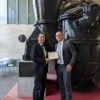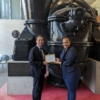The United Nations Industrial Development Organization (UNIDO) ITPO Tokyo Office, in cooperation with the Government of Japan, has launched the “Industrial Vocational Training Program in Africa through Technology Transfer from Japan”. The program aims to contribute to inclusive and sustainable industrial development by strengthening the capacity of local engineers and technicians in Africa by deepening their knowledge and skills of technologies possessed by Japanese companies. For more information, please check the official program page.
As part of this program, Ebara Corporation (Haneda, Japan) conducted a two-week training program in Japan, to provide South African trainees with expertise in selling and disseminating sustainable pump technology, including pump selection, cost estimations, and customer support techniques. The “Training of Trainers (ToT)” in Japan is then followed by a second phase in South Africa, where the trainees will disseminate the knowledge they have acquired back to local engineers and sales representatives in their home countries. This program will help develop the skills of local capabilities in the South African pump technology sales, service, and maintenance industry.
The knowledge disseminated through this program will improve the ability of local engineers and sales representatives to select appropriate pumps, and therefore promote the widespread use of high-quality, high-efficiency pumps in South Africa. As a result, this will help reduce inoperable pumps and out-of-service time, ensuring a stable and safe supply of water in the country. Advanced knowledge of water pump technology is highly applicable in a wide variety of situations, including irrigation and infrastructure development, which are contribute greatly to achieving sustainable and inclusive development. Furthermore, the use of highly efficient pumps can also reduce electricity consumption and helps mitigate global warming and climate change.
Background of invited trainees

(Trainees invited from South Africa,
alongside Ebara Corporation’s first operational pump:
Left – Ms. Mathews, Right – Mr. Joynt)
The two trainees invited to the training in Japan were employees of EBARA PUMPS SOUTH AFRICA (PTY) LTD.
|
Name |
Occupation and Position |
|
Mr. Peter-John JOYNT |
EBARA PUMPS SOUTH AFRICA (PTY) LTD, COO |
|
Ms. Lorraine Jacobeth MATHEWS |
EBARA PUMPS SOUTH AFRICA (PTY) LTD, Internal Sales |
Schedule
Training Period: 10 days in total (between 27 November 2023 to 8 December 2023)
Training Outcomes

(Ebara Corporation, trainees, Minister Plenipotentiary Schroeder from the South African Embassy of Japan, and UNIDO ITPO Tokyo participating in the opening ceremony held on 27 November)
The opening ceremony and orientation on the first day of the training, held on November 27, was attended by Ms. Annelize Schroeder, Minister Plenipotentiary of the South African Embassy in Japan, Ms. Fumio Adachi, Head of UNIDO ITPO Tokyo, and Mr. Ferda Gelegen, Deputy Head of UNIDO ITPO Tokyo. Lively discussions were held on the significance and purpose of the project, the current situation regarding sustainable water distribution in Africa, potential Japanese technologies that can provide solutions to such issues, and the expected outcome of this program.
Training of the trainees began the following day, where Ebara Corporation provided the trainees with knowledge of its pump technology and introduced them to sales and dissemination techniques, including technical planning (e.g., pump selection and cost estimation) and customer support (e.g., pump disassembly, assembly, and center alignment).
- Company profile: Understanding of the structure and vision of Ebara Corporation.
- Product details: Providing specific knowledge of regular and customized pumps.
- Technical planning: Pump model selection and cost estimation techniques.
- After-sales service: Includes disassembly, assembly, and centering of pumps which are required after-sales services.
- Factory visits: Hands-on experience in product manufacturing processes and quality control.
- Inspection of pump installation sites: Visited sites that have installed Ebara Corporation’s pumps, to directly observe the effectiveness of the pump and how they contribute to solving issues.
By providing the experience and training mentioned above, the trainees gained knowledge and skills that will ultimately help sustain a safe and stable water supply in their country. The trainees are expected to take these learnings back to their home countries and disseminate their knowledge to their peers and communities to help improve water supply security. Phase II of the program is scheduled to take place in South Africa from February 2024, and it will be interesting to see how the outcomes of this training program will be applied locally in South Africa.
Interviews with trainees

(Trainees from South Africa: Left – Ms. Mathews, Right – Mr. Joynt)
The trainees from South Africa kindly participated in an interview, and provided the following impressions of their training program in Japan.
- About the overall program
- Peter: “This program was very good. I look forward to taking what I learned back home and applying it in practice. The diverse knowledge of Japanese products, and professional sales manner of Japanese people, will be effective when presenting to clients.”
- Comparison of online training and face-to-face training
- Lorraine: “I felt that face-to-face training is better than online training. Face-to-face is more effective in conveying details, and helps build relationships which are valuable in sales.”
- Contents of the training
- Peter: “The product information I learned is valuable and can be applied in South Africa. I was able to learn a lot efficiently in two short weeks.”
- Impression of Japan
- Lorraine: “What struck me was the cleanliness and respect of the people. I also did a lot of walking in Tokyo, which is good for my health.”
- Important points to convey to colleagues in South Africa
- Peter: “I want to spread the importance of respect. This value is consistent with my personal beliefs.”
- Lorraine: “I want to emphasize the importance of having appropriate knowledge and information, to help my colleagues do their jobs more effectively.”
- About the upcoming Phase II training
- Peter: “Phase 2 will be held in South Africa to dessiminate what we learned from this training programme. Considering the importance of face-to-face meetings, we will communicate key contacts to make the training as effective as possible.”
- Gratitude towards UNIDO, the Government of Japan, and Ebara Corporation
- Lorraine: “I would like to thank the Government of Japan and everyone in Japan, as well as the UNIDO Tokyo Office and Ebara Corporation, for making this program possible.”
The project implemented an on-site training in South Africa (Phase II) in April 2024.
Learn more about Phase 2.




